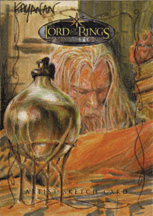JRRT (the “spy”) at the GCCS: An Update
Tuesday, November 10, 2009
posted by Deuce Richardson
 Print This Post
Print This Post

After my Tolkien post last Saturday, several interesting new insights have come to light. Wayne Hammond and Christina Scull, authors of The J.R.R. Tolkien Companion and Guide, posted this response to the Daily Telegraph article over on the J.R.R. Tolkien Collector’s Guide forum:
Readers here who don’t also follow the Mythopoeic Society list may be interested in our answer to a question raised by the article: Did Tolkien in fact turn down the cryptography job, or was it that Tolkien wasn’t needed for it? We wrote:
The latter seems to be the case — that is, not yet needed — according to Carpenter’s note in Letters (p. 436), presumably based on materials in Tolkien’s private papers (to which we ourselves did not have access), and this is supported by comments Tolkien made in letters to Allen & Unwin on 15 September and 19 December 1939. For some months after the training course in March that year — we call it a “training course” in our Chronology (p. 226), Carpenter calls it a “course of instruction”, the Telegraph article calls it a “tester”, presumably it was all an aptitude test of some sort — Tolkien assumed that he could be called into service by the Foreign Office at any time. He wrote as much to Philip Unwin on 15 September (we passed over the particular remark in our Chronology summary), to the effect that he had agreed to the job in the spring, was not yet summoned to it, but it was an open obligation — Britain was now at war — and once he was engaged with it, he did not know how much time it would allow him to devote to outside work.
Then on 19 December he wrote to Stanley Unwin (see Letters, p. 44) that he was “uncommandeered still myself, and shall now probably remain so, as there is (as yet) far too much to do here [in the Oxford English School], and I have lost both my chief assistant and his understudy”. In the same letter, Tolkien comments on his accident “just before the outbreak of war”, on his wife’s illness, and that he was now the virtual head of his department, all of which would have been good reasons for the Foreign Office not to call him to work in cryptography at that time — assuming that he was suited to that work in the first place. His words, at least, give no indication that he turned down a position, but rather that it was a case of what Carpenter says in his note, that Tolkien was informed that “his services would not be required for the present”.
The Telegraph article, which followed on a similar one on the This Is Gloucestershire website a day earlier, is frankly a mess. Even had Tolkien gone to work in cryptography, he would not have been a “spy” as the headline has it. Nor was he necessarily “‘earmarked’ to crack Nazi codes” — some of the personnel at Bletchley Park were there as language, not cipher, specialists. Its staff were already, before 1939, reading messages enciphered on Enigmas — the commercial variety if not the more difficult German army and navy Enigmas. The Royal Navy did not exactly use the secret German traffic “to intercept and destroy Hitler’s U-Boats”, as doing so would have given away the fact that Enigma was not impenetrable. The Lord of the Rings is not, of course, a trilogy — and we could go on.
We agree with our friend Aelfwine, on the Tolkien Collector’s Guide website a few days ago, that the notation “keen” beside Tolkien’s name on one of the official papers very likely refers to the pronunciation of Tolkien’s surname, as opposed to “kine”.
Tolkien’s connection with this part of the war effort was not “revealed for the first time” in the GCHQ exhibition, since it was mentioned in Letters and our Companion and Guide. The GCHQ historian makes the unwarranted assumption that Tolkien “failed to join” because “he wanted to concentrate on his writing career”, and the rather silly remark that “perhaps it was because we declared war on Germany and not Mordor”; and then the reporter carries on in the same vein, with statements such as “the director of GCCS, known only as ‘Alastair G. Denniston'”, as if Alastair Denniston were an unknown figure, when in fact he is well known in the history of British cryptanalysis.
The hypothesis that the GCCS tester was referring to the pronunciation of Tolkien’s name when he noted “keen” on his form is fairly persuasive. At the same time, all the additional biographical information that the Telegraph (and the GCHQ’s museum keeper) never referred to is also persuasive in showing that Professor Tolkien was not more worried about fighting Mordor than Nazi Germany.
The full discussion of Tolkien’s involvement with the GCCS program can be found here.
Tolkien’s status as a “spy,” a designation that would have to be stretched to its fullest limits to be accurate, was explored to ridiculous lengths in a  typically sub-standard article by Underwire‘s Scott Thill here.
typically sub-standard article by Underwire‘s Scott Thill here.
My thanks to Martin Andersson, fantasy/horror scholar extraordinaire.
*Art by Rafael Kayanan and Angus McBride.
